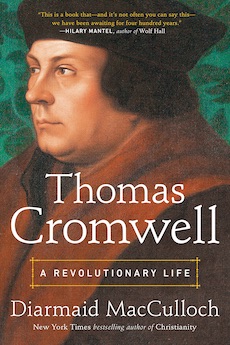By Allen D. Boyer
This learned, readable biography is really four books. It is a history of the years from 1528 to 1540, the start of the English Reformation; it is a Who’s Who for the regime of Henry VIII; it is a masterclass in Tudor history, with a veteran researcher carefully handing documents across the seminar table. And it is the story of Thomas Cromwell, Henry VIII’s loyal, able, amoral right-hand man.
In Hilary Mantel’s Wolf Hall and Bring Up the Bodies, splendid historical novels which Diarmaid MacCulloch compliments, Thomas Cromwell was a bold, attractive figure. (“He can draft a contract,” Mantel wrote, “train a falcon, draw a map, stop a street fight, furnish a house and fix a jury . . . He knows new poetry and can say it in Italian”—and, on-screen, Mark Rylance has played Cromwell as memorably as Paul Scofield played Sir Thomas More.) In this biography, Cromwell shows the same qualities, but they are clouded by a courtier’s ruthlessness and a fixer’s lack of scruple.
MacCulloch’s 1996 biography of Henry VIII’s other great servant, Archbishop of Canterbury Thomas Cranmer, drew eloquently on a wealth of records, memoirs, and correspondence. For Cromwell, the record is sparer. His early life must be reconstructed from stray lines in friends’ letters and a long, laudatory entry in Foxe’s Book of Martyrs. His loyalty to Cardinal Wolsey is reflected in the coat-of-arms he chose, which borrowed from the Cardinal’s escutcheon. A host of records survive from his work in crushing the English monasteries, fewer from his last years in power. Many of his outgoing letters have vanished—quietly removed by loyal clerks who feared their master’s words would be turned against him, Macculloch believes.
Cromwell was a diligent servant of the crown—often more forward than his royal master knew. Covertly, he fostered the Protestant faith.
“In effect he used Archbishop Cranmer as a front-man to create permanent links with Zürich. That Reformed city-state, leader of Swiss evangelical expansion, symbolized everything his master Henry VIII loathed most in the Reformations across the Channel, and yet Cromwell persisted in the project. Indeed, to this we can add Vice-Gerent Cromwell’s steady official promotion in the 1530s of a vernacular Bible, the text of which was largely from William Tyndale, the man at whose murder the King had connived and whom he never forgave for heresy . . . . In all these cases, Cromwell for a while got away with the sleight of hand.”
As late as the spring of 1540, Cromwell was sending his foes to the Tower. He was managing Parliament skillfully, winning a fresh grant of taxes and passing the landmark Statute of Wills. He held the title, unique in English history, of “Vice-Gerent in Spirituals”: deputy to King Henry as head of the Church of England, with the power to override archbishops. A brewer’s son, he had been raised to the peerage as Earl of Essex. With his own son married to the sister of Elizabeth Seymour, the king’s late wife, he counted as something like the king’s uncle.
That spring, Cromwell made a fatal error. With an aide he thought he could trust, he shared a dangerous confidence: that Henry had not consummated his marriage to his new German wife, Anne of Cleves. The Vice-Gerent’s desperate enemies engineered a reversal of fortune. They persuaded Henry that Cromwell had gossiped about the king’s impotence—a treasonous utterance, and an insult that the enraged king would not forgive. On June 10, Cromwell was arrested at a Privy Council meeting; on July 28 he went to the scaffold.
The king regretted this. Within a few months, he upbraided his counselors, objecting that by their false accusations, over trivial matters, “he had been made to put to death the most faithful servant he ever had.” “Self-pity has a talent for rewriting events,” MacCulloch observes. But there was a bleak truth to the king’s complaint.
Novelists are free to envision and suggest. The historian must give the footnotes. This is a historian’s book, in every sense of the word, and a fine one. MacCulloch has gone through the Tudor archives and pulled out what matters.
Allen D. Boyer (ΦBK, Vanderbilt University, 1977), a lawyer and writer in New York City, is the author of “Sir Edward Coke and the Elizabethan Age.” He is currently at work on a history of the law of treason in England. Vanderbilt University is home to the Alpha of Tennessee Chapter of Phi Beta Kappa.




